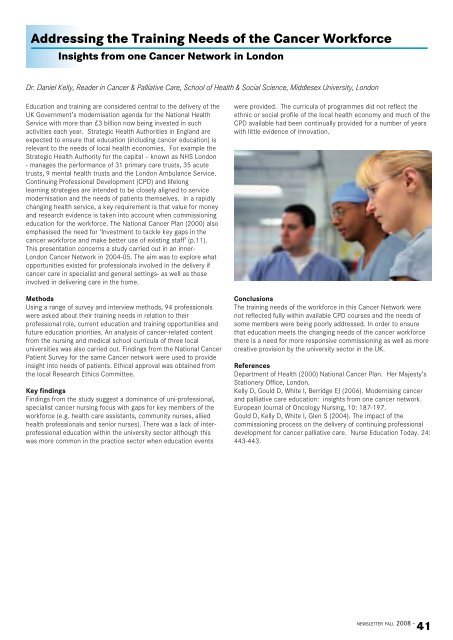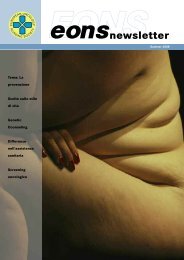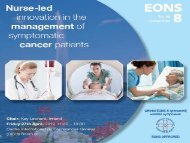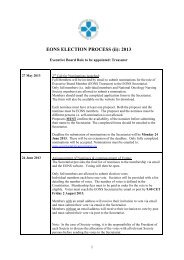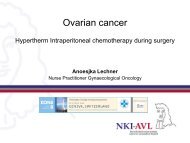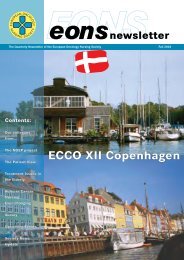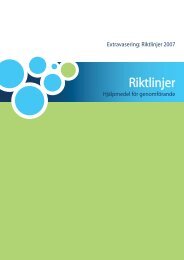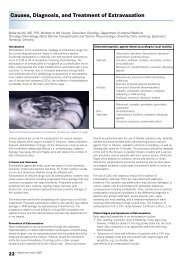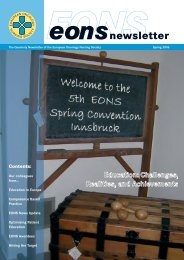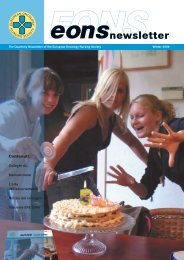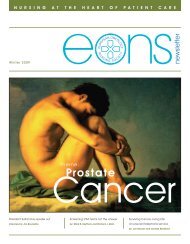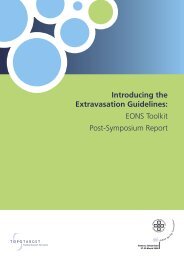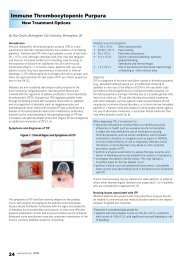In this unique program <strong>the</strong> American, Finnish and Hungarianinstitutes share a common concern for developing a new healthtraining programme which can exceed <strong>the</strong> BSc system considering itstransatlantic objectives.The support of <strong>the</strong> Atlantis Program, which is <strong>the</strong> base of <strong>the</strong>cooperation, has already been won by 107 transatlantic consortiums.However, it is <strong>the</strong> first cooperation regarding nursing education whichis aimed at <strong>the</strong> development and purchase of a training graduateaccepted on both continents (Europe and North-America).All students with such scholarship can receive a degree at bothSemmelweis University and Nazareth College through <strong>the</strong> mutualadmission of <strong>the</strong> studies between <strong>the</strong>ir institutes. In addition, <strong>the</strong>ycan get <strong>the</strong> possibility to make a NCLEX test (American nursingregistration test). In <strong>the</strong> course of <strong>the</strong> students’ foreign studies, <strong>the</strong>ycould acquire vocational-, cultural- and lingual - communicationalknowledge, experiences and competences which could influence<strong>the</strong>ir whole vocational career and <strong>the</strong>y can get new job opportunitiesboth in Europe and in America. Through <strong>the</strong>ir foreign studies <strong>the</strong>y willhave <strong>the</strong> possibility to do <strong>the</strong>ir <strong>the</strong>sis and to continue <strong>the</strong>ir work using<strong>the</strong> opportunities of <strong>the</strong> receiving institution.This September, 16 students are going to start <strong>the</strong> training, 8American students and 8 <strong>European</strong> (4 Hungarian and 4 Finnish).Ones students can participate in <strong>the</strong> programme after an applicationprocess and <strong>the</strong>y will study in Finland, America and Hungary in <strong>the</strong>following four years. The education is free and <strong>the</strong> students obtain ascholarship.Lectures and seminars are held in <strong>English</strong>, which may mean greatadvantage in case of finding a job ei<strong>the</strong>r in Hungary or abroad.International relationsThe Faculty takes pride in its extensive international relations in Europe,Asia and America. In Europe under <strong>the</strong> scheme of <strong>the</strong> ERASMUSExchange Programme every year 15-20 students and lectures have <strong>the</strong>opportunity to enhance <strong>the</strong>ir professional skills and knowledge abroad.Students spend 3 month in <strong>the</strong>ir fourth year at <strong>the</strong> Finnish, Swedish,Norwegian, Dutch, Belgian, Greek, Spanish and Turkish partnerinstitutes, where <strong>the</strong>y participate in professional training. In addition,<strong>the</strong>re are shorter, 1-3 weeks long fur<strong>the</strong>r training course available for<strong>the</strong>m within <strong>the</strong> framework of <strong>the</strong> ERASMUS programme and through<strong>the</strong> coordination of <strong>the</strong> COHEHRE organisation for <strong>European</strong> highereducation in health. The international scholarship can be obtainedvia application. Every year <strong>the</strong>re are scholarship students who spenda whole month in <strong>the</strong> United States and who are also selected with<strong>the</strong> help of application. The Nazareth College of Rochester, New YorkState annually organises a four – week long intensive <strong>English</strong> language,professional and recreational programme for our students in July. All<strong>the</strong> registered students of our faculty can submit <strong>the</strong>ir applicationfor this training, in which almost 100 students and lectures haveparticipated in <strong>the</strong> last three years.The Faculty of Health Sciences has partnerships with severalrenowned universities also from <strong>the</strong> Asian region ( Anhui Universityof TCM, Beijing Medical University, Shanghai Jiao Tong University,Shenyang Chinese Medical University), which provides fur<strong>the</strong>ropportunities for students and lecturer exchange.Should you need any information about our educational programmes(including <strong>the</strong> training of oncology nursing); please don’t hesitateto contact us. Ideas or suggestions for eventual future internationalcollaboration are most welcome too. To contact us, please use:meszarosj@se-etk.hu OR csabaavramucz@yahoo.com. For fur<strong>the</strong>rinformation log on to: http://www.seetk.hu OR www.tcn-atlantis.orgA Summary of <strong>the</strong> Bologna ProcessIn summer 1999 <strong>the</strong> <strong>European</strong> ministers of education met in Bologna Directive on Mutual Recognition of Professional Qualifications ofwhere <strong>the</strong>y agreed to establish a “<strong>European</strong> Higher Education Area”. Nurses. The objectives of <strong>the</strong> Bologna Process are:This involved <strong>the</strong> introduction of <strong>the</strong> Bachelor’s and Master’s degrees • Adoption of a system of easily accessible and comparable degrees(a 3-tier educational system) by 2010. The degrees would be valid (Bachelor’s Master’s and PhD degrees)throughout Europe and meet international norms. The Bologna • Establishment of a <strong>European</strong> credit transfer systemProcess aims to streng<strong>the</strong>n <strong>the</strong> competitiveness of <strong>European</strong> colleges • Promotion of mobilityand universities and support <strong>the</strong> mobility between educational • Promotion of <strong>European</strong> co-operation in quality assuranceinstitutions and courses of study.• Promotion of <strong>the</strong> <strong>European</strong> dimension in higher education• Life long learningAs a result of <strong>the</strong> Bologna process, <strong>European</strong> colleges and• Greater involvement of studentsuniversities are not only optimizing <strong>the</strong>ir former academic structures, • Attractiveness and competitiveness of <strong>the</strong> <strong>European</strong> Higherbut also <strong>the</strong> content of <strong>the</strong>ir academic programmes. The reform of Education Areahigher education has resulted in new opportunities to address age-oldproblems and actively pursue academic policies. Uniform admission In follow up to <strong>the</strong> original meeting, working groups on mobility,criteria, practical application, a clear orientation of competence employability, qualifications, lifelong learning, social dimensions,and streamlined degree programmes can reduce <strong>the</strong> average and <strong>the</strong> position on <strong>the</strong> <strong>European</strong> Higher Education Area in a globallength of study and increase <strong>the</strong> number of graduates. Innovative context have been recently established. Of particular interest isand interdisciplinary, courses of study have given universities a <strong>the</strong> agreement that <strong>the</strong> 46 Bologna signatory countries will developcompetitive edge both nationally and internationally.national qualification frameworks, to be referenced against <strong>the</strong>Bologna 3-tier structure, by 2010.The Bologna Process and <strong>the</strong> <strong>European</strong> Qualification Framework More information on <strong>the</strong> Bologna Process is easily available in manyare without a doubt having an impact on Directive 36 which is <strong>the</strong> languages on <strong>the</strong> internet.40 - newsletter fall 2008
Addressing <strong>the</strong> Training Needs of <strong>the</strong> Cancer WorkforceInsights from one Cancer Network in LondonDr. Daniel Kelly, Reader in Cancer & Palliative Care, School of Health & Social Science, Middlesex University, LondonEducation and training are considered central to <strong>the</strong> delivery of <strong>the</strong>UK Government’s modernisation agenda for <strong>the</strong> National HealthService with more than £3 billion now being invested in suchactivities each year. Strategic Health Authorities in England areexpected to ensure that education (including cancer education) isrelevant to <strong>the</strong> needs of local health economies. For example <strong>the</strong>Strategic Health Authority for <strong>the</strong> capital – known as NHS London- manages <strong>the</strong> performance of 31 primary care trusts, 35 acutetrusts, 9 mental health trusts and <strong>the</strong> London Ambulance Service.Continuing Professional Development (CPD) and lifelonglearning strategies are intended to be closely aligned to servicemodernisation and <strong>the</strong> needs of patients <strong>the</strong>mselves. In a rapidlychanging health service, a key requirement is that value for moneyand research evidence is taken into account when commissioningeducation for <strong>the</strong> workforce. The National Cancer Plan (2000) alsoemphasised <strong>the</strong> need for ‘Investment to tackle key gaps in <strong>the</strong>cancer workforce and make better use of existing staff’ (p.11).This presentation concerns a study carried out in an inner-London Cancer Network in 2004-05. The aim was to explore whatopportunities existed for professionals involved in <strong>the</strong> delivery ifcancer care in specialist and general settings- as well as thoseinvolved in delivering care in <strong>the</strong> home.MethodsUsing a range of survey and interview methods, 94 professionalswere asked about <strong>the</strong>ir training needs in relation to <strong>the</strong>irprofessional role, current education and training opportunities andfuture education priorities. An analysis of cancer-related contentfrom <strong>the</strong> nursing and medical school curricula of three localuniversities was also carried out. Findings from <strong>the</strong> National CancerPatient Survey for <strong>the</strong> same Cancer network were used to provideinsight into needs of patients. Ethical approval was obtained from<strong>the</strong> local Research Ethics Committee.Key findingsFindings from <strong>the</strong> study suggest a dominance of uni-professional,specialist cancer nursing focus with gaps for key members of <strong>the</strong>workforce (e.g. health care assistants, community nurses, alliedhealth professionals and senior nurses). There was a lack of interprofessionaleducation within <strong>the</strong> university sector although thiswas more common in <strong>the</strong> practice sector when education eventswere provided. The curricula of programmes did not reflect <strong>the</strong>ethnic or social profile of <strong>the</strong> local health economy and much of <strong>the</strong>CPD available had been continually provided for a number of yearswith little evidence of innovation.ConclusionsThe training needs of <strong>the</strong> workforce in this Cancer Network werenot reflected fully within available CPD courses and <strong>the</strong> needs ofsome members were being poorly addressed. In order to ensurethat education meets <strong>the</strong> changing needs of <strong>the</strong> cancer workforce<strong>the</strong>re is a need for more responsive commissioning as well as morecreative provision by <strong>the</strong> university sector in <strong>the</strong> UK.ReferencesDepartment of Health (2000) National Cancer Plan. Her Majesty’sStationery Office, London.Kelly D, Gould D, White I, Berridge EJ (2006). Modernising cancerand palliative care education: insights from one cancer network.<strong>European</strong> Journal of <strong>Oncology</strong> <strong>Nursing</strong>, 10: 187-197.Gould D, Kelly D, White I, Glen S (2004). The impact of <strong>the</strong>commissioning process on <strong>the</strong> delivery of continuing professionaldevelopment for cancer palliative care. Nurse Education Today. 24:443-443.newsletter fall 2008 -41


